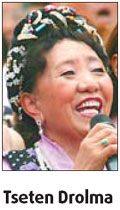Singer sparkles in world of Tibetan songs
|
Tibetan dancers during a performance in Wuhan, Hubei province. The Tibet autonomous region has pledged to increase investment to construct a series of key cultural facilities and boost per capita cultural entertainment consumption. File photo |
When Tseten Drolma was enrolled in the Shanghai Conservatory of Music in 1958, she could barely speak Chinese - "only words like you, me and him". So, her teacher, instead, learned Tibetan to communicate with her.
Tseten Drolma was like an unpolished diamond that her teacher, Wang Pinsu, spent time polishing.
And sparkle she did - in only a year.
In 1959, a documentary film about Tibet required Tseten Drolma to sing its theme song Liberated Serfs Want to Sing. She feared she could not handle the Chinese lyrics, but her teacher was confident: "I'll teach you word by word."
The song became the Tibetan soprano's signature number.

Now 70, the much-honored Tseten Drolma has fond memories of another of her runaway hits. "I was not the first one to do Sing a Mountain Song to the Party. I was so touched when I heard the lyrics. This was exactly what I wanted to express," she said.
One verse of the song: Mother gave birth to me/The Party's light shines into my heart/The old society lashed on my body/Mother could do nothing but cry/The Communist Party asked me to join the revolution/To turn the whip against the enemy.
"I was never beaten as a serf, but I've seen many Tibetans with bruises on their bodies. It was only when the People's Liberation Army came that I learned to express myself, my love and my emotions," she said.
She was born into a poor family with no property.
"The aristocrats owned everything. Whatever we grew on the leased land, we had to give half of the crops to them. In a bumper year, that would leave us enough to get by; but when natural disasters struck, our lives were miserable."
Barely in her teens, Tseten Drolma was sent into the fields to look after the sheep and cattle. Serf owners sent their children to school, but not for a family like hers.
"When the Liberation Army arrived, they lived in tents. I used to see them every day on my way to fetch water. Many of them suffered from breathing problems because of the high altitude. They never interfered with the locals.
"In the old days you had to feed and shelter the Tibetan soldiers. The contrast was sharp," Tseten Drolma said.
She said the Liberation Army had a troupe of performers.
"When I saw them singing and dancing, I really envied them. They were always dressed in colorful costumes and in good spirits."
In 1956, Tseten Drolma joined a youth group. The following year, together with other young people, she embarked on a tour across the country. "I was a little nervous. There was a rumor in Tibet that when the Communists took you away they would not let you return to Tibet."
When she returned to Tibet, her parents were surprised. Tseten Drolma looked well fed and nourished. She wore beautiful clothes.
"The Communists are good people, my parents said."
In 1958, the 21-year-old Tseten Drolma went to a Tibetan public school in Shaanxi province. Six month later, she was "discovered" by the Shanghai Conservatory of Music.
By the time she graduated, she was already a big star. She was in demand by performing troupes in the big cities. But she decided to return to Tibet. She remembered what one of the founding fathers of New China had told her.
"You must not leave Tibet. If you're away for too long, your voice will lose the smell of yak butter," Marshall Chen Yi (1901-72), then vice-premier and foreign minister.
Premier Zhou Enlai (1898-1976) said: "Tibet needs people like you. You're a singer, a Tibetan singer. You should serve the Tibetan people. You should not leave the soil that nourished you."
In Tibet, Tseten Drolma traveled to pastures and villages, singing for ordinary Tibetan people.
"They were proud of me because they thought people who achieved some fame would not be willing to return to their roots," she said.
In recent years, Tseten Drolmas has often acted as a judge in singing competitions. Whenever Tibetan folk singers excelled, such as in the CCTV Young Singers' Contest, she would break into a broad smile.
Singers of ethnic minorities have always been extremely popular because of their passion and authenticity. In the 2008 CCTV New Year's Gala, Tseten Drolma sang a Tibetan song from the 1960s with a young pop singer.
Tseten Drolma said for 45 years she has been singing songs that celebrate their liberation and freedom.
"When I sing them now, I still have the same feeling. It has not changed," she said.
(China Daily 04/18/2008 page6)















